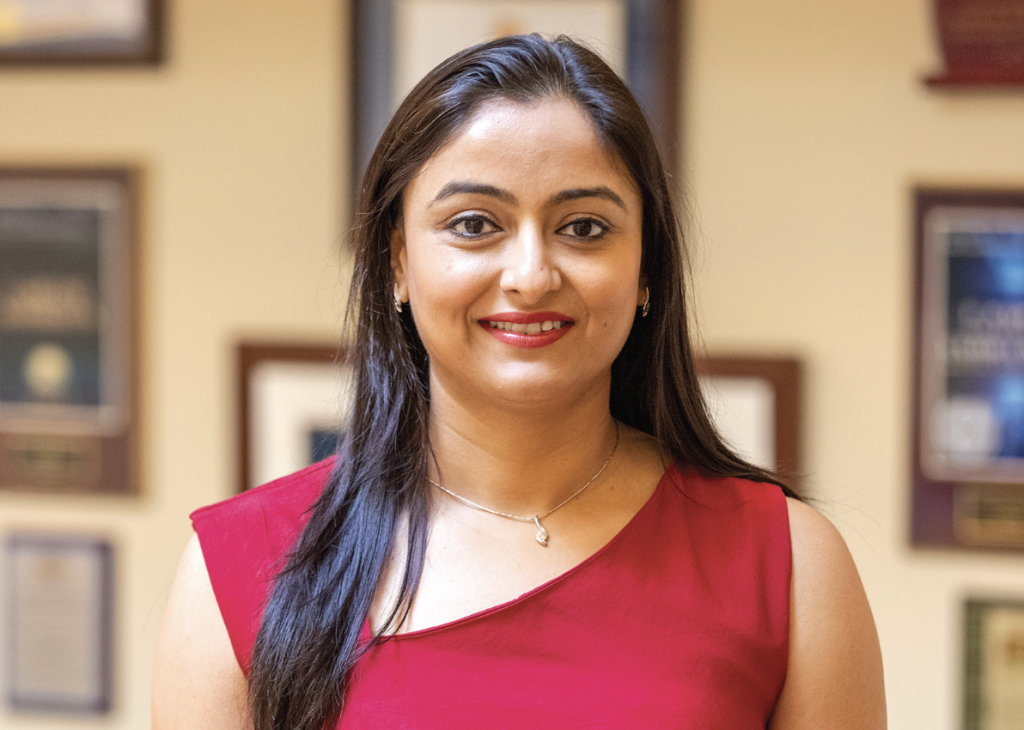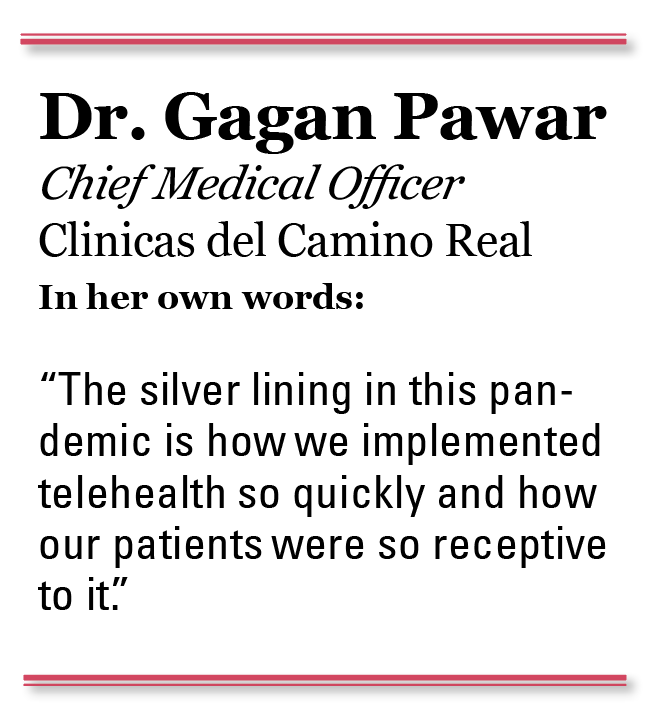
By Chris Officer
Staff Writer
Over the past year, the COVID-19 pandemic has forced organizations to adapt on the fly and abandon traditional practices. One of those systems making significant and decisive operational changes is the nonprofit Ventura County health system Clinicas del Camino Real and its medical team, led by chief medical officer Dr. Gagan Pawar.

Dr. Gagan Pawar, chief medical officer of Clinicas del Camino Real helped lead the 15-clinic network’s transition into telehealth services amidst social distancing mandates due to the COVID-19 pandemic, a system Pawar said would stick around permanently.
As a health service with 15 clinics and 70 practicing medical personnel serving 100,000 patients in the region, Clinicas’ frontline presence has put its staff and its patients directly in the crosshairs of the pandemic.
Using a telehealth platform created by Santa Barbara-based software company Well Health, Clinicas launched an online patient portal that allows users to request appointments, view medical records and lab test results, fill prescriptions and communicate with the clinic about health issues.
“The silver lining in this pandemic is how we implemented telehealth so quickly and how our patients were so receptive to it,” Pawar said, adding that she believes these infection control measures are for the long term, with in-house survey concluding that 70% of Clinicas’ patients were comfortable using the new technology. “We need to prepare for another pandemic. Telehealth is here to stay.”
COMMUNITY OUTREACH
Although more than two-thirds of its patients were open to the telehealth transition, the process wasn’t as simple as applying the software and giving its patients a simple heads-up email. With a significant portion of Clinicas’ patients coming from Spanish-speaking, low-income families, community outreach about COVID-19 and new clinic procedures had to be channeled effectively.
To reach its intended audience, Clinicas amplified its advertising, specifically on Spanish-speaking TV and radio, Pawar said. There was a particular focus on farmworkers and communities hit hard by COVD-19, such as Oxnard, the largest city in the Tri-Counties, and one that is nearly 75% Latino.
 An effective COVID outreach campaign was crucial, considering the increased risk faced by Latinos—studies by Santa Barbara-based Sansum Diabetes Research Institute show nearly half of U.S. Latinos are at risk for Type 2 diabetes, a condition the CDC found increases the risk of severe illness from COVID-19. Farmworkers are also likely to live in relatively crowded households, allowing the virus to spread faster in their communities. As a result of those and other factors, studies from UCLA Health indicate that coronavirus has affected Latino communities in California far more than it has non-Latino populations.
An effective COVID outreach campaign was crucial, considering the increased risk faced by Latinos—studies by Santa Barbara-based Sansum Diabetes Research Institute show nearly half of U.S. Latinos are at risk for Type 2 diabetes, a condition the CDC found increases the risk of severe illness from COVID-19. Farmworkers are also likely to live in relatively crowded households, allowing the virus to spread faster in their communities. As a result of those and other factors, studies from UCLA Health indicate that coronavirus has affected Latino communities in California far more than it has non-Latino populations.
However, Pawar said Clinicas’ outreach—coupled with its open-door and subsidized, or even free, services and its 50-year tenure in the region—has given underserved populations the opportunity to receive reliable health care during irregular times.
“We don’t require our patients to show legal documents in order to be treated for care,” Pawar said. “Clinicas has been (in Ventura County) since 1971, so people know it’s a safe place.”
COMING PREPARED
Pawar, 39, has been with Clinicas del Camino Real for the last 10 years. She said her passion has always been in traditional family medicine, and Clinicas gave her a unique opportunity to serve both administrative and physician roles, as she is the clinic’s CMO as well as a practicing physician.
Pawar completed her residency at the University of Pennsylvania. Before that, she spent a little over two years in Botswana, a landlocked country directly north of South Africa, as an associate doctor and a physician. It was there, she said, that she began to prepare for her work at Clinicas during the pandemic, though she didn’t know it at the time.
“I worked with HIV and AIDS patients, with limited resources,” she said. “And with 36% of the Botswana population infected with AIDS, the major thing there was patient safety, staff safety and family testing.”
UNCONVENTIONAL WISDOM
In addition to telehealth, Clinicas initiated other critical but necessary protocols to keep the community it serves safe. It continued to keep its clinics’ occupancy low by conducting drive-through COVID tests.
And Pawar said Clinicas collaborated with St. John’s Hospitals to work out a system that sends patients with non-emergency medical conditions away from the emergency room and over to Clinicas to ease the ER burden.
The clinic also put preventive health care services—excluding pediatric care—on hold. To offset the suspension of care, Clinicas ramped up its outreach services, essentially mobilizing its health care efforts and providing services such as blood pressure checks, hearing and vision screenings, immunizations and other preventive applications.
Now, as vaccinations begin to roll in, Pawar said Clinicas is again forced to think outside the box and come up with solutions to unforeseen problems. In this case, the vaccination process and its extremely tedious, English-only mandated form.
“It’s something a Spanish-speaking farmworker can’t fill out alone,” Pawar said. “So in addition to administering the vaccine, our staff is filling out the form for patients—and we have translators for other languages, too.”
Reflecting over the last 12 months, Pawar said changes in operational procedures were matched by changes in the mindset of medical professionals.
“In medicine, it’s always been a physician’s No. 1 job was their patients’ safety, but 2020 changed that,” she said. “Now physicians have to be concerned with not only their patients’ safety, but also the safety of their co-workers, their families and themselves.”


